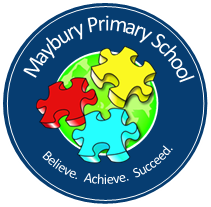EYFS Curriculum
Our highly bespoke and inspiring EYFS Curriculum is designed to reflect the interests and needs of our children and to immerse our children in a language rich environment. We prioritise high quality interactions with adult focussed activities where appropriate. Our children guide and drive their own learning through carefully resourced continuous provision with enhancements to aid the development of skills and knowledge. Our curriculum is unique to us and our children's needs at Maybury Primary School.
Our curriculum is developed to prioritise sequential, progressional learning, where pupils know more and can do more, building on what they have been previously taught. It is also designed to be responsive to the needs of our children, families and community.
Each topic planned, is individually tailored to our children each year, with the aim of ensuring that all children leaving Reception are ready to start the KS1 curriculum. Topics do not always last a specific amount of time but are developed based on the children’s learning at the time and the related core knowledge and skills which need to be taught. All topics are carefully resourced and where possible are introduced with a high quality, diverse story book or age appropriate non – fiction text that reflects the interests and experiences of our children.
Our ambitious Early Years curriculum aims to teach all children the skills and knowledge in order that they reach the seventeen Early Learning Goals described in the Early Years Foundation Stage framework. Our staff are highly skilled and confident with assessing necessary starting points based on quality baselining interactions. Staff know their children well and quickly recognise those who will need early intervention due to entering our setting with low starting points. They monitor who is and is not on track regularly, put in timely catch-up sessions and tailor future planning to provide more opportunities for skill development and progress.
As many of our activities as possible are play-based, however there is also a need for some direct teacher-led activities to ensure all children gain essential knowledge and skills. When appropriate, activities are expertly modelled using Rosenshine's 10 principles of instruction (I do, we do, you do). Priority is given to providing sufficient sustained periods of play with support and resources to allow children to repeat and deepen their taught skill development.
We use Birth to Five Matters as a rich resource to support our knowledge of child development and as a supporting document for our curriculum. We feel that this document reflects our early years vision of embedding quality interactions in a variety of playful situations. It supports our staff to create organic learning opportunities as opposed to being constrained by formal expectations.
Children in Reception follow the Early Years Foundation Stage Curriculum. There are seven areas of learning:
The Prime Areas (these are particularly important for your child's development and future learning) –
• Personal, Social and Emotional Development (PSED) – Self Regulation, Managing Self, Building Relationships
• Communication and Language (CL) – Listening, Attention and Understanding, Speaking
• Physical Development (PD) – Gross Motor Skills, Fine Motor Skills
The Specific Areas (the prime areas are strengthened and applied through these areas) –
• Literacy - Comprehension, Word Reading, Comprehension
• Mathematics – Number, Numerical Patterns
• Understanding The World – Past and Present, People, Culture and Communities, The Natural World
• Expressive Arts and Design – Creating with Materials, Being Imaginative and Expressive
The EYFS framework identifies the essential role of play in your child’s development. It is through both child-led play and play guided by an adult that your child will develop confidence and relationships with others. Through play, EYFS practitioners will help your child to extend their vocabulary and develop their communication skills. The EYFS framework identifies three characteristics of effective teaching and learning:
- Playing and Exploring
- Active Learning
- Creating and Thinking Critically
A greater focus on teaching specific skills will occur as your child progresses through their reception year, which will help them to prepare for year one.
We carefully assess children during their time with us, and regularly review their progress to ensure that our planned activities are meeting their needs. We use Tapestry to capture children’s individual achievements; these will be shared with parents and carers. Maybury Primary School and Nursery highly values the partnership with families and we encourage notes about children’s achievements outside the school environment.
